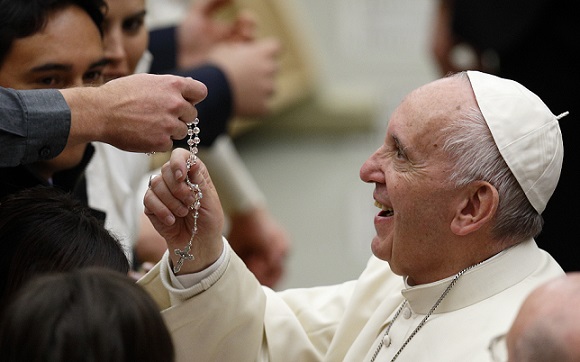Pope Francis: we are called to imitate God

A quote from Pope Francis:
“We are not called to serve simply to receive a reward, but rather to imitate God, who has made himself a servant of our love. Nor are we called to serve only from time to time, but to live in serving. Service is therefore a way of life; in effect it summarizes the entire Christian lifestyle: serving God in adoration and prayer; be open and available; loving others with practical actions; work with passion for the common good “.
Homily in the Church of the Immaculate Conception, Bazu, Azerbaijan, 2 October 2016
CRSTIANS HAVE A MORAL DUTY TO HELP REFUGEES
Christians have a moral obligation to show God's care for all those who are marginalized, especially migrants and refugees, said Pope Francis.
"This loving care for the less privileged is presented as a characteristic trait of the God of Israel and is also required, as a moral duty, to all those who belong to his people," said the pope in the homily of September 29 during a open air for the 105th World Day of Migrants and Refugees.
About 40.000 men, women and children filled St. Peter's Square while the sounds of cheerful hymns filled the air. According to the Vatican, the choir members sing during the mass and come from Romania, Congo, Mexico, Sri Lanka, Indonesia, India, Peru and Italy.
The choir was not the only aspect of the liturgy that celebrated migrants and refugees. According to the Vatican Section for Migrants and Refugees, the incense used during Mass came from the Bokolmanyo refugee camp in southern Ethiopia, where refugees are beginning the 600-year tradition of collecting high-quality incense.
After mass, Francis unveiled a large bronze statue, "Angels Unawares", in St. Peter's Square.
Designed and sculpted by Canadian artist Timothy Schmalz, the sculpture depicts a group of migrants and refugees on a boat. Within the group, a pair of angel wings can be seen, suggesting "that within the migrant and refugee there is the sacred," said the artist's website.
Cardinal designate Michael Czerny, a Canadian colleague and co-head of the Migrants and Refugees section, had a very personal connection with sculpture. Her parents, who immigrated to Czechoslovakia in Canada, are pictured among the people on the boat.
"It's truly incredible," the cardinal told Catholic News Service, adding that when his brother and sister-in-law arrive in Rome to see him become a cardinal on October 5, he expects them to pose for many photos in front of the artwork. .
Before praying the Angelus prayer at the end of the Mass, the pope said he wanted the statue in St. Peter's Square "to remind everyone of the evangelical challenge to be accepted".
The 20-foot tall sculpture is inspired by Hebrews 13: 2, which in the King James translation says: "Do not forget to entertain strangers, because in this way some entertained the angels aback." The sculpture will be exhibited in Piazza San Pietro for an indefinite period, while a smaller replica will be permanently exhibited in the Basilica of San Paolo outside the walls of Rome.
In his homily, the pope began by reflecting on the theme of the world day - "It's not just about migrants" - and stressed that God invites Christians to take care of all the "victims of the throwing culture".
“The Lord calls us to practice charity towards them. It calls us to restore their humanity, as well as ours, and not to leave anyone behind, "he said.
However, he continued, taking care of migrants and refugees is also an invitation to reflect on the injustices that occur in the world where those who "pay the price are always the youngest, the poorest, the most vulnerable".
"Wars affect only some regions of the world, yet weapons of war are produced and sold in other regions which are therefore unwilling to welcome the refugees generated by these conflicts," he said.
Recalling the reading of the Sunday Gospel in which Jesus tells the parable of the rich man and Lazarus, the pope said that even today men and women can be tempted to turn a blind eye "to our brothers and sisters in difficulty".
As Christians, he said, "we cannot be indifferent to the tragedy of the old and new forms of poverty, to the bleak isolation, contempt and discrimination experienced by those who do not belong to" our "group".
Francis said that the commandment to love God and neighbor is part of the "building of a more just world" in which all people have access to the "goods of the earth" and where "fundamental rights and dignity are guaranteed to all" .
"Loving one's neighbor means feeling compassion for the suffering of our brothers and sisters, approaching them, touching their wounds and sharing their stories and concretely manifesting God's tender love for them," said the Pope.